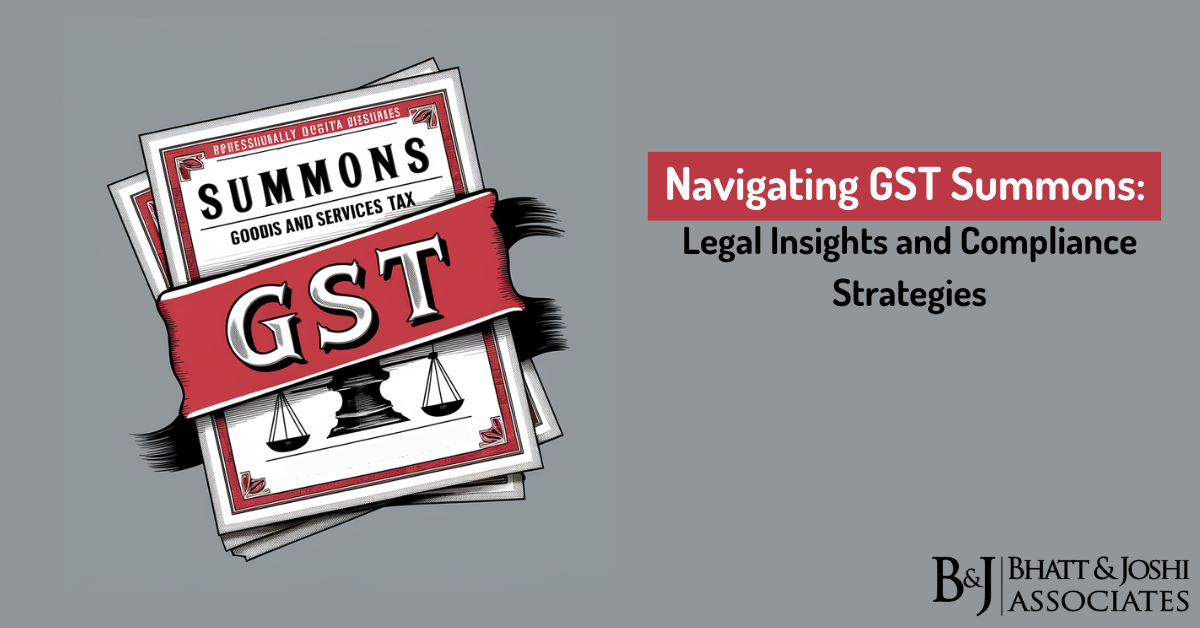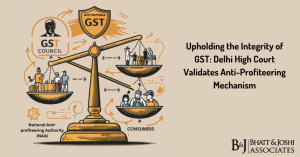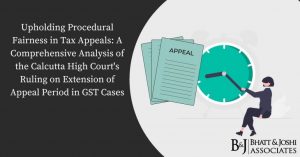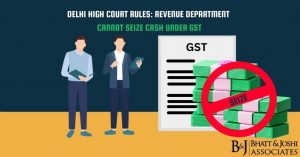GST Summons: Navigating Legal Insights and Compliance Strategies
Introduction
In the complex framework of India’s Goods and Services Tax (GST) regime, the issuance of summons under Section 70 of the CGST Act, 2017, often instills a sense of apprehension among taxpayers. This comprehensive article delves into the procedural nuances and legal bearings of GST summons, offering clarity and strategic guidance to those facing or anticipating such summons.
Understanding GST Summons
Legal Basis for Summons
Under Section 70 of the CGST Act, 2017, tax authorities have the power to issue summons to any person whose testimony is deemed necessary for the collection of evidence or for the recording of a statement as part of an ongoing inquiry. This provision is intended as a tool for ensuring compliance and assisting in the investigation of tax evasion or other non-compliance under the GST framework.
Understanding Section 70 of GST Act:
“Section 70 grants powers to the CE Officer to summon any person to present himself or along with the documents whose attendance he considers necessary either to give evidence or to produce a document or any other thing in any inquiry which such officer is making for any of the purposes of this Act.”
Evidence Value of Statements
Contrary to statements made to police officers under the Indian Evidence Act, which have limited evidentiary value (Sections 25 and 26), statements made to GST officers can bear significant legal weight. Notably, GST officers are not equated with police officers, as established under various legal precedents, thus the statements recorded during GST proceedings can be admissible as evidence in legal proceedings.
Legal Precedent Highlight:
In the case P.V. Ramana Reddy and others vs Union of India, it was judicially affirmed that GST officers do not hold the same status as police officers, which impacts the nature and use of statements recorded by them. In view of the above and subject to section 136 of the CGST Act, 2017, the evidentary value of the contents of the statement recorded can be established.
Procedural Guidelines and Best Practices
Issuance of Summons
Historically, the process of issuing summons, even in the pre-GST era, was governed by guidelines intended to prevent misuse and ensure that summons were used judiciously, primarily as a last resort.
Operational Guidelines:
- Summons should be issued only when other communication methods (like letters or emails) fail or when there is a potential risk to revenue.
- Prior written permission from an officer not below the rank of Deputy Commissioner is required before issuing a summons.
- Summons should specify the purpose clearly and should not be vague or harassing.
Responding to Summons
When summoned, it is crucial for taxpayers to prepare adequately and understand their rights:
- Documentation: Bring all requested documents and understand the questions likely to be asked.
- Legal Representation: While legal representatives cannot answer on behalf of a taxpayer, their presence can ensure the procedural fairness of the summons process.
- Rights During Summons: Taxpayers have the right to request a copy of their statement and should ensure it is accurate before signing.
Legal Insights
The Role of Circulars and Instructions
Circulars such as the CBEC Instruction dated January 20, 2015, emphasize that summons should not be routine and should respect the dignity and rights of taxpayers. It specifically advises against routinely summoning senior management without evidence of their direct involvement in decision-making that leads to revenue loss.
Circular Insight:
“Summons should be issued to CEO, CFO, and General Managers only when there are indications of their involvement in the decision-making process that led to loss of revenue.”
What are the guidelines for issue of summons?
The Central Board of Indirect Taxes and Customs (CBIC) in the Department of Revenue , Ministry of Finance has issued guidelines from time to time to ensure that summons provisions are not misused in the field. Some of the important highlights of these guidelines are given below:
- summons is to be issued as a last resort where assesses are not co-operating and this section should not be used for the top management;
- the language of the summons should not be harsh and legal which causes unnecessary mental stress and embarrassment to the receiver;
- summons by Superintendents should be issued after obtaining prior written permission from an officer not below the rank of Assistant Commissioner with the reasons for issuance of summons to be recorded in writing;
- where for operational reasons, it is not possible to obtain such prior written permission, oral/ telephonic permission from such officer must be obtained and the same should be reduced to writing and intimated to the officer according such permission at the earliest opportunity;
- in all cases, where summons are issued, the officer issuing summons should submit a report or should record a brief of the proceedings in the case file and submit the same to the officer who had authorized the issuance of summons;
senior management officials such as CEO, CFO, General Managers of a large company or a Public Sector Undertaking should not generally be issued summons at the first instance. They should be summoned only when there are indications in the investigation of their involvement in the decision making process which led to loss of revenue.
Conclusion: Ensuring Compliance and Protecting Rights in GST Summons
Facing a GST summons can be a daunting experience, but with proper understanding and preparation, taxpayers can navigate these proceedings effectively. By adhering to the guidelines set forth by tax authorities and understanding their legal rights, taxpayers can ensure that they comply with the law while protecting their interests. This balance is crucial for maintaining trust between taxpayers and authorities, contributing to a more compliant and transparent tax environment.










